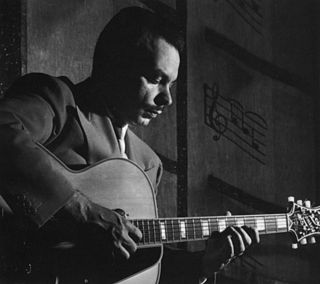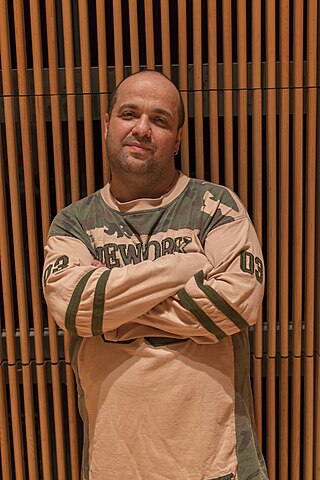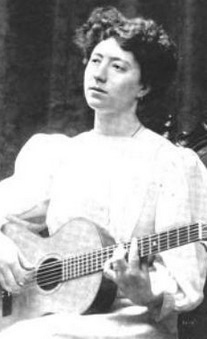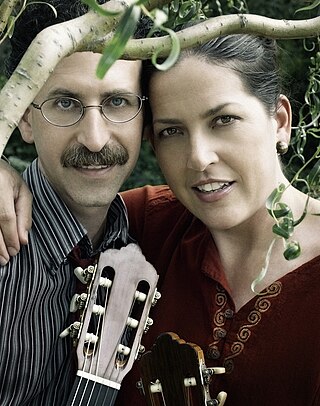Related Research Articles

Francisco Peña Pérez, known as Paco Peña, is a Spanish flamenco composer and guitarist. He is regarded as one of the world's foremost traditional flamenco players.

Andrew James Summers is an English guitarist best known as a member of the rock band the Police. He was inducted into the Rock and Roll Hall of Fame as a band member in 2003. Summers has recorded solo albums, collaborated with other musicians, composed film scores, written fiction, and exhibited his photography in galleries.

Julian Alexander Bream was an English classical guitarist and lutenist. Regarded as one of the most distinguished classical guitarists of the 20th century, he played a significant role in improving the public perception of the classical guitar as a respectable instrument. Over the course of a career that spanned more than half a century, Bream also helped revive interest in the lute.

A guitar solo is a melodic passage, instrumental section, or entire piece of music, pre-written to be played on a classical, electric, or acoustic guitar. In 20th and 21st century traditional music and popular music such as blues, swing, jazz, jazz fusion, rock and heavy metal, guitar solos often contain virtuoso techniques and varying degrees of improvisation. Guitar solos on classical guitar, which are typically written in musical notation, are also used in classical music forms such as chamber music and concertos.

James Stanley Hall was an American jazz guitarist, composer and arranger.

Eliot Hamilton Fisk is an American classical guitarist.

Laurindo Jose de Araujo Almeida Nobrega Neto, popularly known as, Laurindo Almeida was a Brazilian guitarist and composer in classical, jazz, and Latin music. He was one of the pioneers in the creation of bossa nova. Almeida was the first guitarist to receive Grammy Awards for both classical and jazz performances. His discography encompasses more than a hundred recordings over five decades.
William Coulter is an American Celtic guitarist, performer, recording artist, and teacher. Since 1981 he has explored the world of traditional music as a soloist with ensembles including Isle of Skye, Orison, and the Coulter-Phillips Ensemble.

Sérgio Assad is a Brazilian guitarist, composer, and arranger who often performs with his brother, Odair, in the guitar duo Sérgio and Odair Assad, commonly referred to as the Assad Brothers or Duo Assad. Their younger sister Badi is also a guitarist. Assad is the father of composer/singer/pianist Clarice Assad. He is married to Angela Olinto.

Jason Vieaux is an American classical guitarist. He began his musical training in Buffalo, New York at the age of eight, after which he continued his studies at the Cleveland Institute of Music. In 1992, Vieaux was awarded the Guitar Foundation of America International Guitar Competition First Prize, the event's youngest winner.
Frederic Hand is a classical guitarist and composer.

John Michael Glyn Etheridge is an English jazz fusion guitarist, composer, bandleader and educator known for his eclecticism and broad range of associations in jazz, classical, and contemporary music. He is best known for his work with Soft Machine from 1975 to 1978, 1984 and 2004 to present.

First You Build a Cloud is an album by guitarists Andy Summers and Ben Verdery on the Rare Recordings label. The album consists of twelve guitar duets, with Verdery on acoustic and Summers on electric.
Boulou Ferré is a French virtuoso jazz guitarist, composer, arranger, and improviser. He is the brother of Elios Ferré, also a jazz musician, with whom he has recorded widely. His repertoire includes jazz and classical music. He is considered one of the greatest contemporary musicians of the manouche tradition and has contributed to the genre through his knowledge of both jazz and classical music and his interest in the contrapuntal music of J. S. Bach.

Gene Pritsker is a Russian-born composer, guitarist, rapper and record producer living in New York City. He moved to the United States with his family in 1978 and lived in Sheepshead Bay, Brooklyn. He attended the Manhattan School of Music from 1990 to 1994 where he studied composition with Giampaolo Bracali.
The Soldier String Quartet was a string quartet, founded in 1984 by composer and violinist Dave Soldier, that specialized in performing a fusion of classical and popular music. The quartet proved a training ground for many subsequent experimental classical groups and performers, including violinists Regina Carter and Todd Reynolds, and performed at venues ranging from the classic punk rock club CBGBs to Carnegie Hall and the Lincoln Center.

Maria Rita Brondi was an Italian guitarist, lutenist, singer, composer, and music historian.

The Newman & Oltman Guitar Duo is an American classical guitar ensemble formed in 1978. Known for adventurous programming and collaborations as well as their contributions to the repertoire of the guitar duo ensemble, the Duo was founded by Michael Newman and Laura Oltman, who have performed together since it was formed.

Samo Šalamon is a Slovenian jazz composer, guitarist, and bandleader. He has performed on over 35 releases and is credited with over 300 compositions.
David Leisner is an American classical guitarist, composer and teacher whose activities include recording, arranging and writing about music. He has performed as a concert guitarist and as soloist with orchestras at international music festivals and venues including Carnegie Hall and the 92nd St. Y in New York, Jordan Hall in Boston, Royce Hall in Los Angeles and the Guitar Foundation of America International Festival. His performances, compositions, recordings and research are credited with expanding the guitar repertoire through advocacy for neglected composers and music, newly commissioned works and original arrangements. American Record Guide critic Kenneth Keaton wrote, "Leisner is among the finest guitarists performing … He has a probing intellect, finding insights in music that most others miss, and delivering them with a virtuoso technique."
References
- 1 2 3 4 5 6 Summerfield, Maurice J. The Classical Guitar: Its Evolution and Its Players Since 1800, Newcastle-upon-Tyne, UK: Ashley Mark Publishing, 1991. Retrieved November 1, 2021.
- 1 2 3 4 Crowe, Julia. "Dynamic Duo," Guitar Player, May 2005, p. 66–70.
- 1 2 3 4 Small, Mark. "Guitarist/Composer/Teacher Benjamin Verdery Has Taken the Eclectic Road," Acoustic Guitar, July/August 2020, p. 34–6. Retrieved November 3, 2021.
- 1 2 3 4 5 6 7 8 9 10 11 12 13 Saulter, Jerry. "No Boundaries: Benjamin Verdery," 20th Century Guitar, September 2002, p. 31–3.
- ↑ Kilvington, Chris. "Benjamin Verdery," Classical Guitar, June 1985.
- 1 2 Crowe, Julia. "Ben Verdery and Andy Summers," Classical Guitar, May 2005, p. 56–7.
- 1 2 Cmiel, Scott. "No Boundaries," Acoustic Guitar, May 2002.
- 1 2 3 4 5 6 7 8 9 Magnussen, Paul. "Benjamin Verdery," Classical Guitar, July 2002, p. 11–17.
- 1 2 3 4 5 6 7 Ferguson, Jim. "Benjamin Verdery," Guitar Player, August 1984, p. 32–7.
- 1 2 Tommasini, Anthony. "The Schubertiade Ends With Song and Piano," The New York Times, February 22, 1996, p. C14. Retrieved November 3, 2021.
- 1 2 3 Ericson, Raymond. "Debuts in Review," The New York Times, December 14, 1980. Retrieved November 5, 2021.
- 1 2 Kozinn, Allan. "Bach’s Music as a Blank Canvas for Guitarists," The New York Times, February 2, 2010. Retrieved November 3, 2021.
- 1 2 Kozinn, Allan. "The Rare and the Hendrix at Mannes College's New York Guitar Seminar," The New York Times, July 7, 2006. Retrieved November 3, 2021.
- ↑ Kozinn, Allan. "Bach, Celebrated With Strings," The New York Times, September 8, 2009. Retrieved November 3, 2021.
- 1 2 3 Kosman, Joshua. "Ben Verdery, 'Scenes from Ellis Island,'" San Francisco Chronicle, February 26, 2020. Retrieved November 3, 2021.
- 1 2 3 4 5 6 7 8 Donahue, Thomas (ed.). Benjamin Verdery: A Montage of a Classical Guitarist, Lanham, MD: Hamilton Books/ Rowman and Littlefield, 2018. Retrieved November 3, 2021.
- 1 2 3 4 Yale School of Music. Benjamin Verdery, People. Retrieved November 1, 2021.
- 1 2 3 4 5 6 7 Braider, Jackson N. "Benjamin Verdery," Classical Guitar, May/June 1984, p. 14–23.
- ↑ The New York Times. "Rev. John D. Verdery," July 18, 1985, p. A20. Retrieved November 4, 2021.
- 1 2 Magnussen, Paul. "Benjamin Verdery," Guitar International, December 1984, p. 7–10.
- 1 2 3 4 5 6 7 8 9 10 11 12 Chapin, Gary Parker. "Riding the Wind," Acoustic Guitar, September/October 1992.
- ↑ Kerstens, Tom. "Benjamin Verdery, Rie Schmidt," Classical Guitar, April 1987.
- ↑ Holland, Bernard. "Flute and Guitar Compositions of the 1980s," The New York Times, April 17, 1989. Retrieved November 3, 2021.
- 1 2 3 4 5 6 7 Small, Mark. "The Benjamin Verdery Experience," Guitar Extra!, Fall 1991, p. 43–7.
- ↑ Billboard. "Ride the Wind Horse: American Guitar Music," February 9, 1991.
- 1 2 Cooper, Colin. "Benjamin Verdery," Classical Guitar, March 1985, p. 13–6.
- 1 2 Siegel, Micki K. "Guitarist Verdery: from rock to Bach," Us, June 18, 1984, p. 13.
- 1 2 3 Taylor, Lindis. "Master guitarist blurs boundaries," The Dominion Post (Wellington), September 19, 2005.
- 1 2 3 4 5 Mallett, Christopher. "Benjamin Verdery: Playing and Composing Outside the Box," Classical Guitar, Summer 2016, p. 36–9. Retrieved November 3, 2021.
- 1 2 3 4 5 6 Martin, John. "Conversation with Benjamin Verdery," Guitart International, July/September 2005, p. 26–33.
- ↑ 92Y. Benjamin Verdery, Instructors. Retrieved November 4, 2021.
- ↑ Ardoin, John. "Verdery shines in Majestic concert," The Dallas Morning News, November 22, 1983.
- ↑ Barker, Frank. "Guitar Trio," The Guardian, August 24, 1984.
- ↑ Crain, Mary Beth. "Finger Pickin' Good," LA Weekly, February 17, 2011. Retrieved November 3, 2021.
- ↑ Cmiel, Scott. "All Hail Benjamin Verdery: Festival of New American Music," San Francisco Classical Voice, November 6, 2012.
- ↑ Cooper, Colin. "Ben Verdery," Classical Guitar, November 2010.
- 1 2 Woodhouse, Jon. "Benjamin Verdery: Guitarist and Composer," Maui Beat, Thursday, July 17, 2014, p. 3–4.
- 1 2 3 4 Crowe, Julia. "Ben Verdery," Classical Guitar, September 2006, p. 11–6.
- 1 2 3 Cooper, Colin. "Benjamin Verdery: Taking Music to the people," Classical Guitar, May 1994, p. 11–6.
- 1 2 3 4 5 Verdery, Benjamin. "What a Journey," Benjamin Verdery: A Montage of a Classical Guitarist, Lanham, MD: Hamilton Books/ Rowman and Littlefield, 2018, p. 68. Retrieved November 4, 2021.
- 1 2 Kandell, Leslie. "A Collaboration in Keeping King's Dream Alive," The New York Times, January 7, 1996. Retrieved November 3, 2021.
- 1 2 3 Assad, Sérgio. "Charisma," Benjamin Verdery: A Montage of a Classical Guitarist, Lanham, MD: Hamilton Books/ Rowman and Littlefield, 2018, p. 1–4. Retrieved November 3, 2021.
- ↑ Lash, Hannah. "For Ben," Benjamin Verdery: A Montage of a Classical Guitarist, Lanham, MD: Hamilton Books/ Rowman and Littlefield, 2018, p. 30–2. Retrieved November 3, 2021.
- ↑ Bambarger, Bradley. "Versatile Virtuoso: Guitarist grooves to the music of Bach and Hendrix," Star-Ledger, December 2008.
- ↑ Robb, Peter. "Chamberfest: Stringing along with Benjamin Verdery, the mayor of Guitartown," Artsfile, July 22, 2019.
- ↑ Newman, Anthony. "Ben and Tony," Benjamin Verdery: A Montage of a Classical Guitarist, Lanham, MD: Hamilton Books/ Rowman and Littlefield, 2018, p. 46–7. Retrieved November 3, 2021.
- ↑ Cooper, Colin. "Bach – Two Generations Concerti for Guitar and Chamber Orchestra," Classical Guitar, March 1985.
- ↑ Duarte, John. "Bach" (review), Guitar, December 1983, p. 41.
- ↑ Henken, John. "Ride the Wind Horse: American Guitar Music," Los Angeles Times, June 9, 1991. Retrieved November 3, 2021.
- ↑ McLellan, Joseph. "A Travel Guide to Classical Guitar," The Washington Post, March 27, 1992.
- ↑ Hull, Andrew. "Review: Ben Verdery, Soepa," Guitarra Magazine, July 2002.
- ↑ Marsh, Steve. "Start Now," Classical Guitar, August 2006.
- ↑ Nicolas, François. "Branches/Benjamin Verdery," Guitare Classique, September 2006.
- 1 2 Textura. "Ben Verdery: Scenes from Ellis Island," Reviews. Retrieved November 3, 2021.
- ↑ New York City Classical Guitar Society. "Peace, Love and Guitars: Ben Verdery and Friends in two world premiere video concerts." Retrieved December 21, 2021.
- ↑ Borolo, Luigi. "Andy Summers and Ben Verdery," Classical Guitar, April 2008, p. 11–7.
- ↑ Kozinn, Allan. "The guitar on record," Guitar Review, Fall 1986.
- ↑ Acoustic Guitar. "The Schmidt/Verdery Duo, The Enchanted Dawn," Reviews, November 1999.
- ↑ Radio & Records. "R&R National Airplay," March 18, 1988, p. 74.
- ↑ Ben Verdery's Hawaii Masterclass. About. Retrieved November 4, 2021.
- ↑ Verdery, Benjamin. Easy Classical Guitar Recital, Alfred Publishing, 1999. Retrieved November 4, 2021.
- ↑ Crowe, Julia. "Celebrating the 20th Anniversary of the 92nd Street Y’s Concert Series," Classical Guitar, Summer 2018, p. 28–9. Retrieved November 3, 2021.